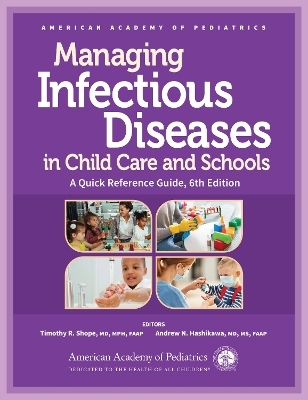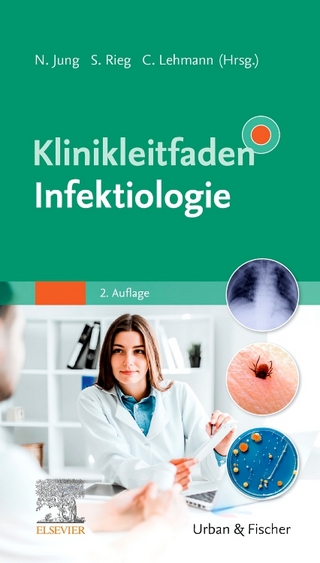
Managing Infectious Diseases in Child Care and Schools
American Academy of Pediatrics (Verlag)
978-1-61002-659-8 (ISBN)
Completely revised and updated, the new sixth edition of this award-winning quick reference guide provides essential information about the prevention and management of infectious diseases in early childhood education settings, such as child care centers and schools.
This edition is aligned with the most recent version of the premier American Academy of Pediatrics (AAP) source of information on infectious diseases, Red Book®: 2021–2024 Report of the Committee on Infectious Diseases, 32nd Edition.
The robust section of more than 55 quick reference fact sheets on common infectious diseases and symptoms has been expanded to include a new sheet with pediatrician-approved guidance on best practices regarding COVID-19. Managing Infectious Diseases in Child Care and Schools now includes information on pandemic preparedness and introduces a new website that will be continually updated with time-sensitive information for the prevention of infectious diseases.
As always, the guide is easy to use and provides clear, authoritative guidance on limiting the spread of infection.
Timothy R. Shope, MD, MPH, FAAP, is an academic general pediatrician and professor of pediatrics at UPMC Children’s Hospital of Pittsburgh. Dr Shope has over 30 years of experience consulting with early childhood educational programs and schools, the Department of Defense, and state policymakers on the topic of managing infectious diseases. He speaks regularly at national meetings and webinars and contributes to many publications on the subject. Dr Shope is a member of the American Academy of Pediatrics Council on Early Childhood. Andrew N. Hashikawa, MD, MS, FAAP, is a pediatric emergency medicine (PEM) physician and associate professor at the University of Michigan. He serves as a volunteer child care health consultant for local child care centers. He earned his medical degree and completed a pediatric residency at the Mayo Clinic. He then completed a PEM fellowship and a master’s degree in epidemiology at the Medical College of Wisconsin. Dr Hashikawa has served as the American Academy of Pediatrics (AAP) Michigan Early Childhood Champion for over a decade. He has helped create training content on injury prevention and medication administration for child care providers on the AAP e-learning platform Pedialink. He is an executive committee member of the AAP Council on Early Childhood. Dr. Hashikawa has published extensively in child care research related to health and safety. He created MCRISP (Michigan Child Care Related Surveillance Program) to assist child care centers in reporting illnesses to the local public health department. He received the Head Start 50th Anniversary Award in 2015, and in 2019, he received the AAP Council on Early Childhood Dr Susan S. Aronson Early Education and Child Advocacy Award for making a significant contribution to improving the health, safety, and development of children in early education and child care settings. Dr Hashikawa resides near Ann Arbor with his wife and 3 teenage daughters.
Preface
About This Book
What Is New in This Edition?
Chapter 1 Overview of Managing Infectious Diseases in Child Care and Schools
Introduction
Keeping Children and Adults in Group Settings Healthy
Roles of Families, Staff Members, and Health Professionals in Managing Infectious Diseases for Children Enrolled in Early Education and Child Care
Planning and Policies
Chapter 2 Reduce the Risk of Infection: Practice Prevention
Safe Food Preparation and Service
Hand Hygiene
Changing Diapers, Soiled Disposable Training Pants, and Soiled Underwear
Preventive Oral Health
Standard Precautions
Sanitation, Disinfection, and Maintenance
Heating, Ventilation, and Air-conditioning
Chapter 3 Health of Teachers, Caregivers, and Other Staff Members
Introduction
Preemployment Requirements and Ongoing Adult Health Appraisals and Immunizations
Immunization With Recommended Vaccines
Oral Health Practices in Early Childhood Education Settings
Health Limitations for Staff Members
Policies and Procedures Related to Caring for Staff and Children Who Are Ill
Staff Learn, Teach, and Practice Minimizing Infectious Diseases
Chapter 4 Recognizing the Ill Child: Inclusion/Exclusion Criteria
Daily Health Check
Elements to Observe and Information to Gather
Situations That Require Medical Attention Right Away
Conditions That Do Not Require Exclusion to Control Spread of Disease to Others
Conditions Requiring Temporary Exclusion
Procedures for a Child Who Requires Exclusion
Reportable/Notifiable Conditions
Preparing for Managing Illness
Chapter 5 Signs and Symptoms Chart
Chapter 6 Quick Reference Sheets
Bedbugs
Bites (Human and Animal)
Boil/Abscess/Cellulitis
Campylobacter
Chickenpox (Varicella-Zoster Infections)
Clostridium difficile (Also Called “C diff”)
COVID-19
Croup
Cryptosporidiosis
Cytomegalovirus (CMV) Infection
Dental Caries (Early Childhood Caries, Tooth Decay, or Cavities)
Diaper Rash
Diarrhea
Diarrhea Caused by Specific Types of E coli (Escherichia coli)
Ear Infection
Fever
Fifth Disease (Human Parvovirus B19)
Giardiasis
Haemophilus influenzae Type b (Hib)
Hand-Foot-and-Mouth Disease
Hepatitis A Infection
Hepatitis B Infection
Herpes Simplex (Cold Sores)
HIV/AIDS
Impetigo
Influenza
Lice (Pediculosis Capitis)
Lyme Disease (and Other Tick-borne Diseases)
Measles
Meningitis
Molluscum Contagiosum
Mononucleosis
Mosquito-borne Diseases
Mouth Sores
Mumps
Norovirus
Pinkeye (Conjunctivitis)
Pinworms
Pneumonia
Respiratory Syncytial Virus (RSV)
Ringworm
Roseola (Human Herpesvirus 6 and 7)
Rotavirus
Rubella (German Measles)
Salmonella
Scabies
Shigella
Shingles (Herpes Zoster)
Staphylococcus aureus (Methicillin-Resistant [MRSA] and Methicillin-Sensitive [MSSA])
Strep Throat (Streptococcal Pharyngitis) and Scarlet Fever
Sty
Thrush (Candidiasis)
Tuberculosis (TB)
Upper Respiratory Infection (Common Cold)
Urinary Tract Infection
Vomiting
Warts (Human Papillomavirus)
Whooping Cough (Pertussis)
Chapter 7 Infectious Disease Outbreaks, Epidemics, Pandemics, and Bioterrorism
Why Children Are Especially Vulnerable
Planning
Types of Infectious Disease Emergencies
Closure of Group Care Facilities
Quick Communication and Initiation of Emergency Procedures
Symptom Records
Parent/Legal Guardian Notification
Tracking Procedure
Corrective Action
Chapter 8 Sample Letters, Forms, and Relevant Resources
Child Health Assessment Form
Special Care Plan Form
Medication Administration Packet
Letter to Staff About Occupational Health Risks
Refusal to Vaccinate Form
Staff Health Assessment Form
Routine Schedule for Cleaning, Sanitizing, and Disinfecting
Selecting an Appropriate Sanitizer or Disinfectant
Cleaning Up Body Fluids
Sample Health Information Consent Form
Sample Food Service Cleaning Schedule
Diapering Poster
Gloving
Infections Caused by Interactions of Humans With Pets and Wild Animals
Symptom Record Form
Enrollment/Attendance/Symptom Record
Situations That Require Medical Attention Right Away
Sample Letter to Families About Exposure to Communicable Disease
Glossary
Index
| Erscheinungsdatum | 16.03.2023 |
|---|---|
| Verlagsort | Elk Grove Village |
| Sprache | englisch |
| Maße | 225 x 276 mm |
| Gewicht | 907 g |
| Themenwelt | Medizin / Pharmazie ► Gesundheitswesen |
| Medizin / Pharmazie ► Medizinische Fachgebiete ► Pädiatrie | |
| Medizin / Pharmazie ► Pflege ► Kinderkrankenpflege | |
| Studium ► Querschnittsbereiche ► Infektiologie / Immunologie | |
| ISBN-10 | 1-61002-659-4 / 1610026594 |
| ISBN-13 | 978-1-61002-659-8 / 9781610026598 |
| Zustand | Neuware |
| Informationen gemäß Produktsicherheitsverordnung (GPSR) | |
| Haben Sie eine Frage zum Produkt? |
aus dem Bereich


